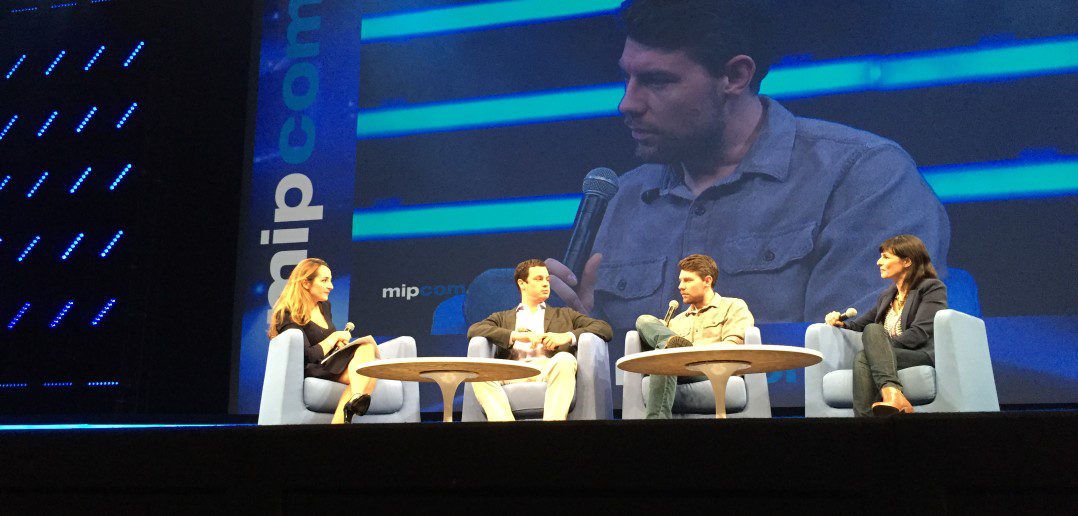It’s an exciting day for fans who enjoy watching people resolve real-life dilemmas in supernatural contexts.
To discuss Outcast, the latest creation by Robert Kirkman of The Walking Dead, foreign correspondent Elsa Keslassy of Variety sat down for an informative chat with David Alpert, executive producer of Outcast and The Walking Dead; actor Patrick Fugit (whom you may remember from Cameron Crowe’s film Almost Famous); and Sharon Tal Yguado, head of Fox International Studios and EVP of global scripted entertainment for Fox International Channels.
Keslassy began with a basic question: « How did you pick Outcast? »
After the success of The Walking Dead, « It was inevitable that I ask Robert [Kirkman], ‘what’s next, what’s your passion project?’, » said Yguado. « It was David, me and Robert around the table, and Robert thought about it. He talked about this guy putting his family back together while battling against evil forces, and I couldn’t forget the spark in his eye. »
In Outcast, Kyle (played by Fugit) tries dealing with the repercussions of his demon possession in a small-town setting.
According to Yguado, Kirkman is exceptional at giving life to « that relatable, identifiable, grounded character that we all care about week to week, and putting him in this wild backdrop that we haven’t seen on TV yet. »
And like The Walking Dead, Outcast began life as a comic book for fans before becoming a series… with a few small differences.
« We were doing the comic and the script simultaneously, » said Alpert, which differentiates this project from The Walking Dead; the comic had been out for years before it became an AMC production. It was their first time developing a script and a comic at the same time.
But the challenge was more optical than logistic. « You have to work hard to convince people zombies are real—most people don’t believe they are, although I do, » Alpert quipped. « But many people believe that demonic possession is real. » They approached Outcast in a grounded, character-driven way, hoping believers will look at it and say « that’s a show for me ».
« But if you don’t believe in demonic possession, it won’t be something that turns you off, » Alpert added.
Keslassy observed that, in many ways, The Walking Dead changed the way people experience the zombie genre; it became less kitschy B-movie fare and evolved into a way to pose serious questions about human survival and what we’re capable of doing in a world where our hopes for tomorrow have been shaved down to dismal minimums.
She asked, « Is Outcast reinventing exorcism drama like The Walking Dead did for zombies? »
« Part of it is redefining what a serialised exorcism drama means, » said Alpert. « The conversation is, ‘We’ve seen an exorcism, but what happens after that? When the demons possess you and you say all these awful things to loved ones that wound them to the core, and now you’re better, how do you go back to living that way?’
« We looked at it through a number of lenses, like addiction or alcoholism; how do you deal with someone who had an inner demon, how do you trust that they’re better? »
In Outcast’s small-town setting, not everyone will be accepting or understanding of Kyle, he revealed. « Some will be accepting; others will treat him like he did something wrong. »
Fugit elaborated with his personal experience playing Kyle for television. « When you work in film, you have characters and a story you have to completely explore in an hour and a half, » he said. « That’s not a lot of time. And I love doing films. But when you have something like this, where you have 10 full hours in the first season to really explore these characters and this world, and to solve small mysteries that open the door to bigger mysteries, that’s very exciting. »
It also helps that there’s so much material to work with, and time to dig through it. « For something based on a graphic novel or comic, like Outcast, there’s so much there already. And the writers are adding depth and texture to it, » Fugit added.
Cinemax also proved useful in bringing the project to life. « Outcast opens with a shocking teaser, a very Robert Kirkman signature type of teaser, » said Yguado. « We wanted to make sure no one would make us cut it or make us compromise our commitment to fans. A premium cable partner like Cinemax was perfect. »
« Cinemax was incredibly supportive of every decision we’ve made along the way, » Alpert agreed.
« With the freedom for Robert to create the show that he wants, » Yguado added.
Naturally, Keslassy then asked what the budget was for the show.
« Higher than your average show, » Yguado said vaguely. « It was developed in an unusual way, where an international channel company opens a studio in the US, develops on-spec, then sells to a US network with the intention of bringing it to the world, almost like a theatrical release like we did with The Walking Dead. But once we found that partner, the relationship became very traditional. Cinemax paid full price. »
And as with The Walking Dead, their promotional strategy focused on targeting fans first. « We brought the show to Comic Con in July; seeding the show first through evangelists, » said Yguado.
Outcast, billed as a serialised exorcism drama, is the first series produced by Fox International Studios. The script was developed in-house and sold to Cinemax in the US. It will premiere in early 2016.




